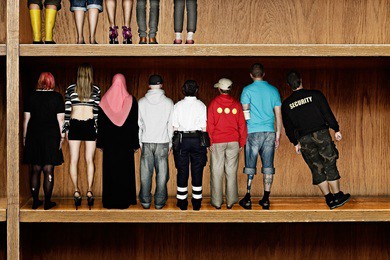
To be read as a human book is an extraordinary feeling. Every conversation you have with a reader is different and their reasons for choosing to read you are so diverse that it is often hard to plan your whole conversation/”reading” in advance. What is a guarantee, at least for me, is that whether you are a book or a reader, the Human Library is a place that creates moments of understanding and connection.
In the three years I have been involved in the Human library, I have experienced both perspectives — being a book and a reader. My book title was “Watch out! Did you see that? And, other sighted moments on a sightless journey.” I talked about my life experiences being blind and being a first generation Canadian. I shared my experiences growing up and the challenges of navigating certain environments and situations with in my community, education, and my every day life. To illustrate many of my challenges I had to share some of the difficult parts of being blind. For example, I talked about my family’s first time travelling to Vancouver, and the difficulty in being unable to experience the wonders of seeing the mountain ranges. Or, I shared what it was like to re-imagine how I could facilitate a workshop to make it more accessible for both myself and for those who would be coming to my session. What often surprised me, as the book, was how I was also able to get so much out of my readers because they would share with me too. They shared their experiences with disability and would let me know which aspect of my story really connected with them.
Thinking as a reader of human books, it’s important that I note that, to hear someone’s story of discrimination or misunderstanding can be a difficult moment. As a reader and listener, you are sitting there with someone who is real, and who has been stereotyped. They might be telling you a story about being discriminated against because of their sexual orientation and religion — and it’s not just the fact that their story is real that can impact you, but also the reality of knowing that the experience they are talking about happened not years ago, but instead just a week ago, yesterday, or even this morning. The stories shared by the human books can challenge your perspectives as a reader since they can give stories of hardship and success a voice and a face in the form of a real person. The human books make experiences that you might only ever hear about in the media personal.
As a reader, I found that the human library has often provided me a time to ask questions in a respectful and supportive place. And as a human book, every reader’s questions can and did transform me.
If you’re interested in learning more about Human Libraries, you should consider checking out the 2017 Equity, Diversity, and Inclusion Week here at the U of A. A full list of the 2017 human book list can be found online. Walk-in visitors are all welcomed to the Human Library: A Place for Us All, Thursday — Saturday in the Rutherford Library.
